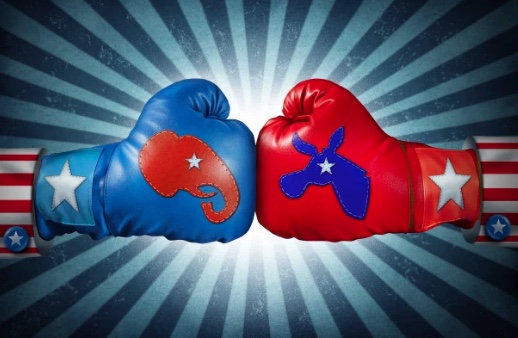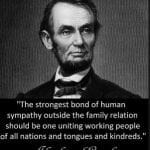

America’s two-party system, which at one time allowed to the free flow of ideas and discussion within a basic ideological framework, has become rigid to a point where it often seems there are only two sets of beliefs that are allowed in this country. There is simply no room in today’s Republican or Democratic parties for dissent or disagreement – the party line is what matters, and if you are a member (from elected leaders down to everyday citizens), you are expected follow it. It is no longer a matter of, “because I believe in this and this, I am a Democrat”; instead, it has fully become, “I am a Republican, so I believe this.” Across any range of issues – from the size and role of government, to the need for tax cuts, to guns, to abortion, to gay marriage, to religion, to civil rights and anything else big and small that affects us (including where we get our news) – party affiliation all too often dictates what we are supposed to believe. And if one party believes something, then the other is required to adopt the exact opposite position.
But the fact remains, this is a diverse country (including diversity of ideas), and no matter how dominant a force party politics may be, there are more than 300 million Americans capable of making up their own minds and coming to their own conclusions. So what happens to those who don’t blindly agree with their party line? Despite the best efforts by congressional leadership to promote a unified party platform, they only have the power to enforce it among their own ranks, not among regular voters. And among those voters, there is no doubt countless Democrats who believe in a strong social safety net but also support tax cuts or gun rights. Or Republicans, who while otherwise follow the party, support abortion rights or marriage equality. This diversity of belief may not be political, but instead based on personal or family experience or circumstance, geography, or simply because while a party can have a declared unified belief system, individuals do not work that way.
So for the staunch Democrat who grew up hunting and learned responsible gun ownership and usage at a young age, or the lifelong Republican who places the unquestioning love of a gay sibling ahead of an unquestioning party ideology, where do they go? How do these individuals decide to vote when neither party truly reflects them? It is far too rare for politicians to stand up and offer voters other options. On occasion, someone may “reach across the aisle” for a single vote, and be considered brave for doing so, but this is usually a matter of someone mere stepping up to do the right thing (or conceding on some issue expecting something in return at a later date).
During the 2016 election campaign, attention was given to Tim Kaine’s stance on abortion: that while he was personally and religiously opposed, he supported abortion rights at a government level. Although there’s no doubt, countless Americans would have shared this view (including some Republican lawmakers who have voiced similar opinions in the past), within the context of the campaign, it differed from the Democratic party line and did nothing to gain support from Republicans. He was accused by some of playing politics with the issue and trying to have it both ways. Conversely, during the 2004 presidential election campaign, Dick Cheney was vocally supportive of his daughter Mary Cheney, who is openly gay, though he did not support the issue of same-sex marriage. When discussed during the campaign, these actions gained little support from Democrats, and despite some displeasure from the most conservative wings of the Republican party, did not diminish support. Again, the accusation of playing politics with a personal matter was raised. In both of these cases, aside from a single (and often divisive) issue, the vice presidential candidates otherwise stood as strong defenders and proponents of their party’s rigid platform, as is expected of them.
People frequently mourn the loss of influence of party moderates on both sides. While this in itself is cause for concern, and while moderates are often times the most willing to deviate on one or more issues (while largely sticking to party policy), it is average Americans who associate with a party but do not believe in the party’s strict lines, that are left to suffer the most. Do they ignore one issue that may be deeply personal to them, and agree to vote for people who strongly oppose that issue, simply because they largely agree with a wider generic framework? Or do they pass up an opportunity to support leaders with whom they generally agree, for the sake of that one point of interest? There are no easy answers, and it is a question that each voter must answer for themselves, but as long as political parties live by the “winning is everything” and “the party line is all that matters” policy, voters are left with few choices.


